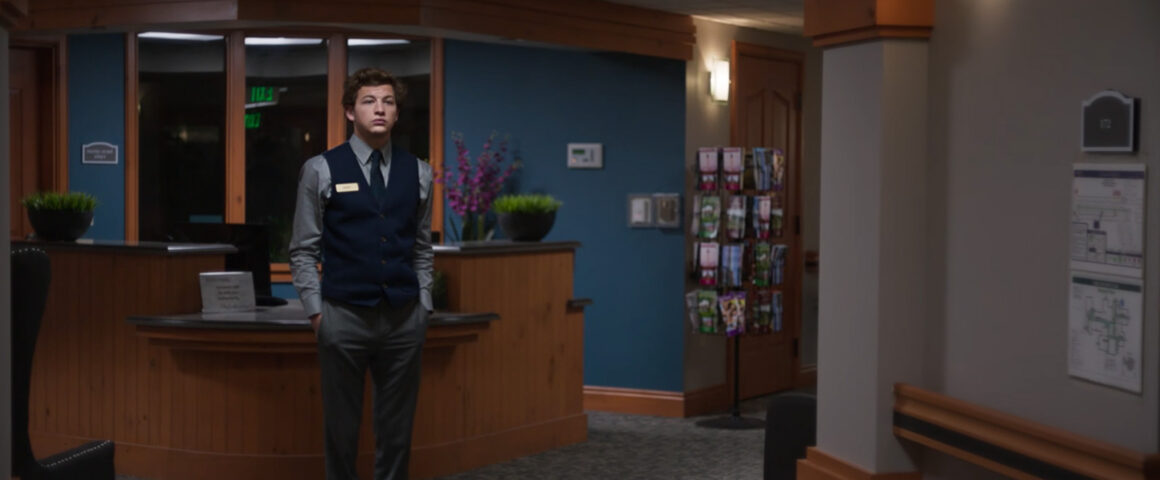As an adult in her 30’s, hearing tales of mythical creatures such as unicorns, Santa Clause, or RuPaul seem entirely plausible. There’s still some sparkle left in the sun, so they must (like talking M&M’s) exist. Yet I find it hard to believe that we live in a world that still makes movies like The Night Clerk. But alas, with a heavy sigh of disappointment, we do. Because in the same year that something as culturally shifting as “Parasite” takes Best Picture, we have one of the most dated and bizarre representations of neurological differences ever to hit the (digital) screen.
This new thriller (written and directed by Pulitzer and Tony winner Michael Cristofer) tells the story of Bart (Tye Sheridan, “Ready Player One”), a hotel clerk with Asperger’s Syndrome that has a fascinating hobby. For you see, Bart is handy with various sorts of tech — allowing him to record and keep the personal goings-on within his place of work. And when our protagonist returns to his basement home after a long day, Bart begins to live out a fantasy. It is the kind in which he has no flaws, can rewind past mistakes, and this game of make-believe all plays out on his various home-fashioned monitors.
But one night, Bart notices some suspicious activity going on within one of the guest’s rooms. He hears whispers of suggestive lines and a gun falling to the floor. Panicked, Bart tries his best to get to the hotel to resolve the situation — but such a valiant effort turns his life a bloody sort of topsy turvy. Now, with a cop (John Leguizamo, “Nancy”) following his every move, his mother (Helen Hunt, “The Sessions”) understandably freaking out, and a beautiful girl (Ana de Armas, “Knives Out”) charming her way into his heart, Bart has to make some crucial, life-changing, decisions.
From such a description, The Night Clerk may appear to be just another movie driving down the indie highway. And when you consider the film landscape that 2020 has thus far provided, a story featuring a protagonist on the autism spectrum should come out above the likes of other cartoonish depictions from the past. Instead, this bland thriller manages to become a cinematic time machine that no one (not even Biff) wants ever to go near.
Now to clarify, I don’t have Asperger’s, nor am I autistic. But as a kid who was told she wouldn’t make it past high school, due to how her brain processed common information, I can relate to viewers who might want to see themselves (neurologically) represented on screen. But if you’re one of the people who share more commonalities with this film’s protagonist, it could be quite a struggle to see yourself (positively) in a somewhat creepy, voyeuristic individual. But that’s a call only someone in Bart’s shoes can make.
But what can be agreed upon is Tye Sheridan’s performance. Though showcasing confidence and fairy tale charm in the recent “X-Men” franchise, Sheridan seems to be unevenly cast here — a common thread many thought of with his role in “Ready Player One.” You buy that he is a kid caught at the wrong place at the wrong time, and yet you feel no sympathy for his actions. He embodies all of the stereotypical moves from Hoffman’s “Rain Man” but in the most vanilla of ways — making Bart a heartless forgotten SNL character.
A similar imbalance can goes for the other supporting players. Helen Hunt sleepwalks through her enabling protective role, Leguizamo seems to be auditioning for a secret Columbo remake no one knows about, while Johnathon Schaech (“Quarantine”) plays the most conventional of possibly criminal widowers. But then there is Ana de Armas — a talent who seems too good for this film from the moment she walks into frame. She’s a bright sparkle of sequin on an otherwise cheap disco dress, who brings humanity to her robotic dialog — finding believability in a role that in other hands could have been dramatically flatter than a pancake.
But the true criminal here is the director himself. Though the material has the promise of being a modern noir, Michael Cristofer lacks any sort of signature style nor the focus to deliver the proper cinematic punch. He desperately tries to emulate Hitchcock, but instead comes off like dollar store Nolan — driving every little element that works down into the murky waters of bad B-Movie territory.
At the end of the day, even though there are some earnest bones in the body of The Night Clerk, it is a tale that could have been told with more polish, care, and respect that people like Bart deserve than they rarely receive. And with “The Peanut Butter Falcon” and other mindful bits of cinema gaining traction, perhaps this will be a flash in the unfortunate Tinseltown pan. Or at least, that’s what I’d like to believe.



